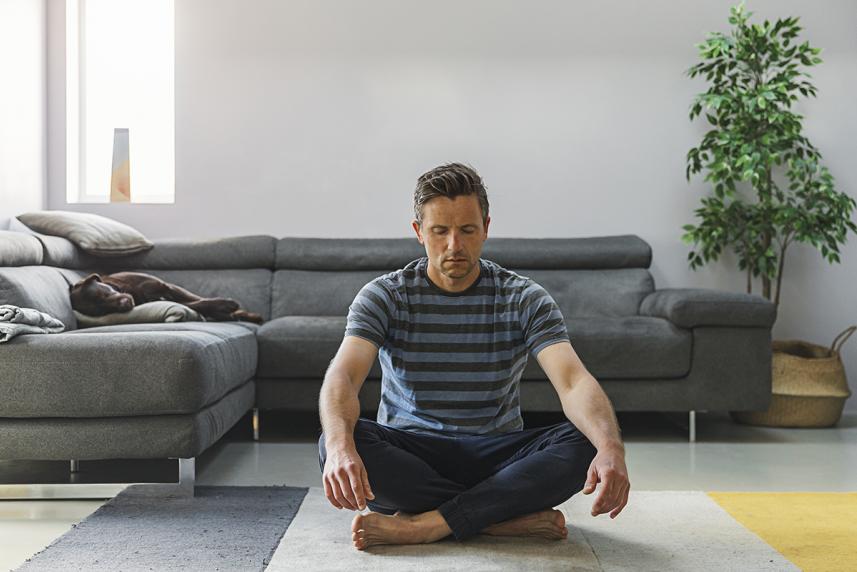
If you've tried self-help techniques and they aren't working, it might be time to seek professional help.

A little bit of stress is healthy. But prolonged stress can take a toll on your body and mind. Here’s why, and how to pump the brakes so that you don’t crash and burn.
Stress is often painted in a bad light. But the truth is, some stress is good. In fact, you need a little pressure to get things done every day.
“Without a stress response, we would just be unmotivated piles of Netflix watchers, not wanting to do anything with any motivation,” says Wendy Suzuki, PhD. She’s a professor of neural science and psychology at the Center for Neural Science at New York University. She’s also the author of Good Anxiety: Harnessing the Power of the Most Misunderstood Emotion.
The trouble is, many of us are running on a surplus of stress. That jolt is helpful in brief spurts, but chronic stress can have harmful effects on your health.
Here’s what short-term and chronic stress does to the body. Plus, some strategies to calm your body when things feel as though they’re getting out of hand.

If you've tried self-help techniques and they aren't working, it might be time to seek professional help.
Demanding situations set off your body’s stress response, also known as your fight-or-flight reaction.
The stress response starts with a cascade of chemicals that tell your body to be ready for action. Key chemicals include the hormones cortisol, epinephrine and norepinephrine. “These hormones are the reason our blood pressure and heart rate increase during a stressful time,” says Deena Adimoolam, MD. She’s a specialist in endocrinology and metabolism in New Jersey.
Here are just a few things that happen when those stress hormones surge:
All of this prepares you to jump into action — to fight or flee — when you face a threat. Even your immune system is part of the stress response. In fact, short-term stress can enhance your body’s self-healing abilities.
Aside from helping you avoid an oncoming bus or catch your toddler before she falls off the slide, short-term stress “wakes you up” and helps you achieve goals. “Stress gives us energy. It increases our heart and respiration rate, and we need that for the next creative project in our lives,” says Suzuki.
A little stress, in short bursts, can motivate us. Stress hormones signal that something needs your attention, explains Suzuki. That nervousness you feel before a big project is due keeps you focused so that you complete it. The jitters you get before a trip help you concentrate on planning details so that you don’t miss your flight or forget essentials. (Passport? Check. Medication? Check.)
Then, when you tick off your accomplishments, the relaxation response should set in and tamp down stress hormones. You feel a wave of relief after your quick action spared your child a tumble on the playground. When you get to the airport gate on time, everything in order, you can breathe easier. And when you hit your due date on a work project, you give yourself permission to unwind.
Problems arise when stress — or the stress response — doesn’t go away. You may get stuck in stress mode because you can’t calm yourself down, even after a threat has subsided. Or perhaps the threat is ongoing: You might face daily demands from work or serious issues in a relationship or other life hardships. In these situations, your body will likely pay a price over time.
“Chronic stress can lead to issues like high blood pressure, anxiety, depression and insomnia,” Dr. Adimoolam says. She adds that chronic stress can also worsen underlying health conditions such as diabetes or heart disease. There’s also evidence that chronic stress can affect your reproductive and digestive systems, says Suzuki. (Learn how to spot these sneaky signs of anxiety.)
In addition, chronic stress can negatively affect:
Your immune system. Over time, unchecked stress raises your risk of catching an infection or virus such as the common cold. It does this by lowering your white blood cell count, including a type of white blood cell known as lymphocytes. White blood cells help fight off infection. The fewer there are to protect you, the easier it is for a virus or bacteria to settle in.
Sending up a stress SOS? The Optum Store carries a range of products to help you unwind. Explore now.
Your brain. A boost of the stress hormone cortisol helps you focus short term, but prolonged exposure can cause damage. “It will first damage and then kill brain cells in key areas we need to be productive and lead strong, vibrant lives,” Suzuki says. These areas include the hippocampus and the prefrontal cortex. The hippocampus is critical for long-term memory, and the prefrontal cortex helps with decision-making and focus, Suzuki explains. As a result, long-term stress can raise your risk of memory problems over time.
Your weight. While stress hormones alone don’t cause weight gain, you may be less motivated to eat well and exercise when your fight-or-flight response is firing on all cylinders. When we’re stressed, we’re less able to regulate our emotions and behaviors. It’s all too easy to turn to chips and ice cream to avoid negative feelings. We may also become depleted under chronic stress. Going to the gym may feel like yet another chore. These behaviors may cause stress-related weight gain, Dr. Adimoolam says.
You don’t want stress to disappear, but you also don’t want it to control your life. “We need to become masters of regulating our stress response because it has long-term implications for the health of our bodies and of our brain,” Suzuki says.
Try one or more of the following strategies to help your body come down from a stress response.
Suzuki’s go-to stress reliever is deep breathing. “It’s so immediately effective for that feeling of anxiety and the underlying stress response,” she says.
In fact, deep breathing is one of the best ways to activate your relaxation response. Also known as “rest-and-digest,” the relaxation response is the counterpart to fight-or-flight. “It’s just as important and basically does everything the opposite of the stress response,” she explains. “It lowers our heart and respiration rate and shuttles blood from our muscles toward our digestive organs,” Suzuki says.
How to do it: Breathe in for 4 counts and hold that breath for 4 counts. Then breathe out for 4 counts and hold that breath for 4 counts. Aim to breathe through your belly and diaphragm, as opposed to breathing from your chest and shoulders. Repeat as many times as you like or until you feel relaxed.
Practice deep breathing during low-stress moments — perhaps first thing in the morning or just before bed. Get comfortable with deep breathing so that you can eventually use it to calm yourself down during moments of stress. (Try these little mindfulness breaks any time of day.)
“Moving your body is one of the most transformative things you can do to decrease your stress levels,” Suzuki says. Even simple movements such as walking around your dining table help release feel-good chemicals, such as endorphins, that boost mood and lower anxiety. “It’s like giving yourself a wonderful neurochemical bubble bath.”
How to do it: Pause your to-do list throughout the day to squeeze in quick bouts of movement. You might set a timer to go off every 30 to 60 minutes and take a walk around your block or stand up and do some gentle stretches at your desk. If you can swing it, meet a friend for a workout (socializing is also a stress buster).
Rest and sleep are essential for taming chronic stress. Sleep deprivation raises your cortisol levels, the last thing you need when they’re already sky-high. Unfortunately, prolonged stress and anxiety can actually cause insomnia and other sleep problems, including sleep apnea. And in a cruel twist, insomnia and lack of sleep can worsen stress. But it’s possible to break this cycle and put both sleep and stress issues to bed.
How to do it: Suzuki recommends these small changes, which can make a big difference:
A therapist can help you explore ways to tackle your biggest stressors. They can teach you ways to slow the runaway train of thinking that can keep you in stress response mode. Cognitive behavioral therapy (CBT) is a technique counselors use to help people recognize and change unhelpful patterns of thinking. It’s a proven way to ease anxiety and stress, research finds.
You can find a therapist by calling your doctor or health insurance company for a referral. You can also speak to a therapist online from the comfort of your home. Virtual therapy can be just as effective as in-person therapy, research shows. Schedule an appointment now to talk to an Optum network therapist through our virtual care portal — no insurance required. Start your assessment.
Additional sources
Stress and insomnia: Sleep Foundation (2021). "Stress and insomnia"
Cognitive behavioral therapy: Cognitive Therapy and Research (2012). “The Efficacy of Cognitive Behavioral Therapy”
Effectiveness of telehealth therapy: Journal of Anxiety Disorders (2018). “Computer Therapy for Anxiety and Depression Disorders is Effective, Acceptable and Practical Health Care”